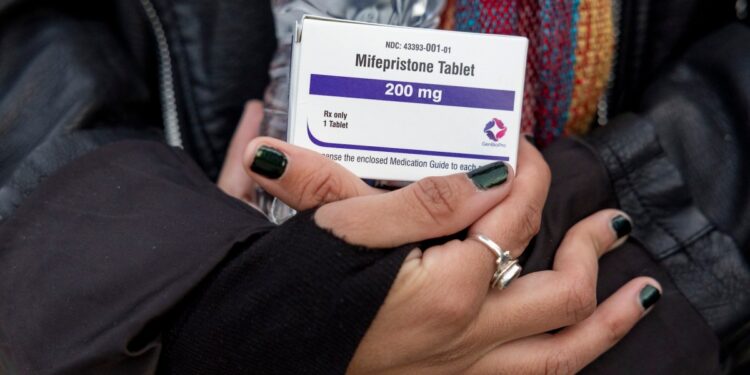The anti-abortion movement has launched a pressure campaign urging President Donald Trump’s administration to take steps toward a nationwide ban on medication abortion, the method used in nearly two-thirds of all abortions nationwide.
On Wednesday, 30 leading anti-abortion activists sent a pair of letters to the acting heads of the Department of Justice and the FDA, urging a multifaceted crackdown on abortion pills.
The letter to the Department of Justice takes aim at the distribution of mifepristone by mail. The FDA has allowed providers to mail mifepristone to patients since 2021, and the mail, of course, has been an important part of the supply chain for the medication for decades. But the letter, addressed to Acting Attorney General James McHenry, asks him to take “immediate action” to implement the Comstock Act, the 19th century anti-obscenity law that made it a crime to mail “every article or thing designed, adapted, or intended for producing abortion.” The Biden administration interpreted the law to only apply to illegal abortions. And the Comstock Act has not been enforced for many decades, as I reported in 2023, when lawyers in the anti-abortion movement were increasingly raising the act in proposed local laws and legal filings:
In the past, the act was enforced by an army of postal inspectors who regularly peeked into people’s mail, screening letters and packages en masse for mentions of sex and contraception, [historian Lauren MacIvor] Thompson says. Today, though the statute is still on the books, a century of court decisions about privacy, freedom, and the First Amendment have rendered it dormant.
In their letter this week, the anti-abortion movement leaders ask the Department of Justice to prosecute people who mail “abortifacient matter—including the abortion pill regimen of mifepristone and misoprostol.” For now, at least, they ask the DOJ to “prioritize investigations and enforcement against those who are involved in the illegal distribution of abortion pills”—an apparent reference to the activist networks that have sprung up since the Supreme Court overturned Roe v. Wade and who distribute the medication covertly into states that have passed total bans on abortion. But legal scholars have warned the Comstock Act could potentially be used to cut off the supply chain of any tool or medicine used in abortion—forceps or suction devices or even surgical gloves—and in this way could amount to a total abortion ban.
In their second letter, the anti-abortion leaders ask the FDA to sharply curtail access to mifepristone by re-implementing outdated rules for how the pills must be prescribed.
Mifepristone, used in combination with misoprostol, has been approved by the FDA as a safe, effective way to end an early pregnancy since 2000. But the initial approval came with a set of restrictions that the FDA has gradually lifted as abortion became less stigmatized and evidence continued to pile up demonstrating mifepristone’s safety and effectiveness. In their letter, anti-abortion movement leaders lobby the administration to revoke these moves, including a 2016 change to allow the drug to be prescribed up to 10 weeks in pregnancy rather than 7; pandemic-era rules that allow it to be prescribed by telehealth and dispensed by mail; and a 2023 change to allow retail pharmacies like CVS and Walgreens to dispense the medication.
As leading abortion-rights scholar Mary Ziegler pointed out on Friday, it remains to be seen just how far Trump will go in catering to the demands of the anti-abortion movement that backed him.
During his campaign, Trump actively obfuscated the anti-abortion track record from his first presidency that he had once bragged about. But since taking the oath of office on Monday, he’s pardoned anti-abortion protesters who blockaded clinics in violation of federal law and issued an executive order with language indicating support for “fetal personhood,” the legal theory that embryos have the same rights as people.
Both Trump’s nominee for Attorney General, Pam Bondi, and his nominee for FDA Commissioner, Marty Makary, are seen as an allies of the anti-abortion movement. As my colleague Julianne McShane reported on Sunday:
As Florida’s AG, Bondi established her anti-abortion record by defending state laws that mandated anti-abortion counseling and a 24-hour waiting period before getting an abortion. It’s no wonder, then, that the anti-abortion advocacy group Students for Life Action greeted the news of Bondi’s nomination saying, “There’s a great deal for pro-life organizations…to be excited about.”
During Bondi’s confirmation hearing last week, Democrats did not ask her whether she would enforce the Comstock Act. But when asked if she would defend the FDA’s current rules for mifepristone against anti-abortion movement lawsuits seeking to invalidate them, she offered cold comfort. “I will not let my personal beliefs affect how I carry out the law,” she said.
Julianne McShane contributed reporting.







